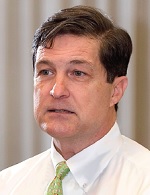In December, the Federal Open Market Committee (FOMC) voted to increase interest rates for the first time in more than seven years. Naturally, this has raised many questions about the effects of higher interest rates on the United States — but what about the effects globally, especially on emerging market economies? And how much, if at all, should the Fed weigh the global effects as it considers future policy changes? Given the size of the U.S. economy and the extent to which we are connected to other countries through trade and financial markets, these are important questions to ask.
In general, any country's policymakers face what's known as a "trilemma": As long as they allow free capital movement and monetary policy authorities have independent control of interest rates, they must allow their exchange rates to fluctuate. If they want to defend their exchange rate against another country's currency, they must either impose capital controls or follow that country's monetary policy, thereby tying their central bank's hands. In short, they cannot simultaneously have independent monetary policy, free capital movement, and a fixed exchange rate.
Monetary policy in the United States following the Great Recession underscored this trilemma for policymakers in emerging market economies: Should they lower interest rates in an effort to prevent currency appreciation, thereby risking overstimulating their economies? Or should they allow their currencies to appreciate and risk lowering their exports? In the end, many of these countries did cut interest rates, though not as much as the United States. They thus offered relatively higher returns, leading to substantial inflows of capital and currency appreciation. Some observers cited Fed policy for contributing to excessive credit growth and potentially creating financial instability in emerging markets.
During the spring of 2013, the global economy experienced what some have dubbed a "taper tantrum." When then-Chairman Bernanke signaled that the Fed would soon wind down asset purchases, global markets reacted strongly and emerging market economies saw currency depreciation, asset-price declines, and investment outflows. In part, this might have reflected investors' pre-existing concerns about these economies' prospects. But some critics blamed the Fed for creating instability. Ultimately, however, the effect of U.S. policy changes on foreign economies depends on the decisions of foreign policymakers — although it is naturally distressing when our actions present them with difficult trade-offs.
Now that the Fed has begun raising interest rates, some observers and policymakers are concerned about the potential for these increases to again create volatility abroad. While these concerns are understandable, in my view they should not affect the pace or timing of U.S. monetary policy changes. The Fed has a dual mandate to keep inflation low and stable and to promote maximum employment in the United States. To comply with that mandate, we must base our decisions on the economic outlook here at home. If the Fed were to take into account the impact of its policy abroad, especially on more volatile emerging markets, it would risk losing sight of its statutory mission.
That doesn't mean we can ignore the rest of the world. The Fed should, and does, carefully monitor foreign economic developments that have implications for U.S. growth and inflation, and take them into account when making policy decisions. In 1998, for example, the Fed cut rates following financial crises in Asia and Russia that had the potential for spillover effects on the U.S. economy. And one rationale for not raising rates last September was turbulence in China and emerging market economies that might have posed a risk to U.S. growth, although my view then was that those spillovers were likely to be minimal.
As the Fed tightens monetary policy, it's possible that policymakers in other countries, particularly the emerging market economies, will be faced anew with difficult policy choices. One way the Fed can help mitigate unnecessary volatility is by communicating clearly our objectives and expectations, giving markets time to adjust. For example, despite the "taper tantrum" in 2013, once the Fed began tapering off its asset purchases in December of that year, the reaction in global markets was much more muted, perhaps in part because the Fed had been very clear in its communications.
As the world's largest developed economy, the United States plays a unique role in the global economy. Many countries depend on American consumers to buy their exports. The U.S. dollar is the dominant global reserve currency, and U.S. Treasury bonds are the preferred safe asset of investors across the globe. In short, the health of the U.S. economy matters for the health of the world economy — and the health of the U.S. economy depends critically on the effective conduct of monetary policy. In the long run, the most important thing the Fed can do for the rest of the world is to remain focused on promoting low and stable inflation at home.




